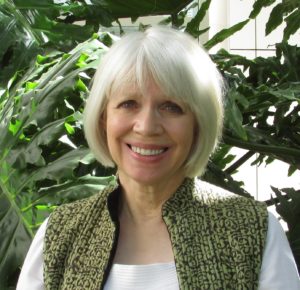The Getty Oral History Project includes interviews with individuals across the spectrum of the Getty Trust, including the Getty Conservation Institute (GCI), which does international work to advance the field of art conservation. Of the four programs in the Getty Trust, the GCI stands out both for its scientific collaboration with other Getty entities, and its dedication to sharing conservation information worldwide. Kathleen Dardes’ lengthy career working in various GCI training programs is emblematic of this mission.
Kathleen Dardes is the head of Collections at the Getty Conservation Institute. She studied art history and classics at Temple University in the 1970s, and then went on to study art conservation at the Courtauld Institute of Art in the 1980s, specializing in textile conservation. Dardes then worked as a conservator at the Metropolitan Museum of Art, the Cathedral of Saint John the Divine, and the Museum of Fine Arts in Boston. She joined the GCI in 1988 as the senior coordinator for the Training Program.

When Dardes joined the GCI in 1988, this Getty program was only three years old and trying to establish itself in the field. Dardes recalls working to build credibility as an international art conservation organization, and struggling against “skepticism” about this new Getty entity:
“I think part of it had to do with the fact that we were so darn rich, and we could buy pretty much anything we wanted and could do anything we wanted, and we weren’t beholden to anyone except our trustees. That gave us a certain freedom, which I think was sometimes resented in the broader field. So we had to prove ourselves.”
Part of the way the GCI proved itself was investing heavily in the international training programs Dardes helped create to share conservation best practices worldwide. These included the idea of preventive conservation, or delaying the deterioration of objects through procedures like managing collections environments. Dardes explained the need for this training, saying,
“In the field, you’d hear these funny stories about people making all sorts of elaborate measures to control environments in a gallery space or storage area, but the roof was leaking [laughs] or there was a pest issue or something. So we were looking at the small details, and not the larger system that the museum is.”
In recent years, the GCI has undertaken a project called MEPPI or Middle East Photograph Preservation Initiative. Dardes explained that the GCI and several partners worked hard to establish much-needed photograph preservation courses throughout the Middle East to help institutions protect these collections. This project included many challenges, not the least of which is political instability. In her interview Dardes shared the inspirational story of one MEPPI participant’s dedication to conservation, even in the midst of the Syrian Civil War:
“When we arranged a follow-up course in Lebanon, which was open to people from throughout the region, one of the participants in Syria, at great personal risk, got on a bus with her father, who was there to protect her, and took a bus from Syria to Beirut. Took her two days to do that, a trip that normally takes half a day. Couldn’t fly because it was too difficult to go to the airport, too risky, but came to Beirut to be with her old colleagues and take a course—which we all found absolutely stunning. But that’s how committed she was, not only to the course itself, to the collections she was in charge of, but also to the network that was forming. She wanted to see her old colleagues and be involved in this thing called MEPPI. So it sounds very pollyannaish, but it was a wonderful thing. People who don’t often have the opportunity to be involved in projects like this don’t take them for granted. It was something that we all thought was remarkable.”
Though she has not explicitly used her skills as a textile conservator while at the GCI, Dardes has found opportunities to engage with the larger implications of cultural heritage around the world. Indeed, being a part of the Getty Trust has opened global opportunities for her—and the GCI—to share and teach conservation best practices on an incredible scale.
To learn more about her work with the Getty Conservation Institute, check out Kathleen Dardes’ oral history!